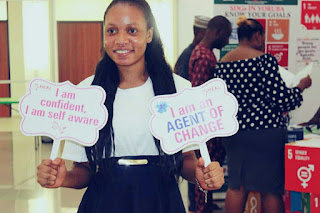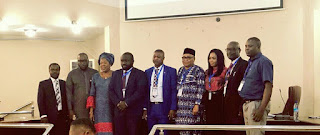THE ROLE OF YOUTH IN ACHIEVING THE SDGs IN NIGERIA
 |
| Fanny Obasuyi, A young Nigerian & passionate volunteer |
The article below is an excerpt from a paper presentation I made at the University of Benin, Edo State, Nigeria when I was invited to speak on The Role of Youth in Achieving the SDGs on the 19th of December, 2018. The workshop was organized by the University of Benin's Sustainable Development Desk Office (SDDO) in collaboration with the University of Chester, United Kingdom and it was themed, "Implementing the Sustainable Development Goals Framework in Nigeria: Building a Research Network to Explore Barriers, Prospects and Strategies".
In September 2015, World Leaders from 193 nations gathered at the UN headquarters in New York to adopt the Sustainable Development Goals (SDGs), widely known as Agenda 2030 and they pledged to mobilize efforts to end all forms of poverty, tackle climate change and fight injustice and inequality, while ensuring that no one is left behind. Nigeria is also one of the countries that agreed upon the 2030 Agenda. There are 17 goals which are integrated, universal and transformative and the aim is to make the world a better place for us all to live in.
It is well-known and accepted that Governments are the primary drivers for achieving the Agenda 2030 and while it is not news that the Nigerian Government set up a structure in this regard, that is, the Office of the Senior Special Adviser to the President on Sustainable Development Goals (OSSAP-SDGs), under the supervision of Princess Adejoke Adefulire and that her office has developed a framework for implementation; but what is news is that 3 years on, Nigeria’s position on the SDG index and dashboards which describe countries’ progress towards achieving the SDGs is 150 with an index score of 47.5%, we are just above six countries: Afghanistan, Yemen, Madagascar, Congo, Chad and the Central African Republic. This tells the world that our performance is very very poor, and to us, this means something is seriously wrong somewhere.
For me, it is impressive that a lot of young people in Nigeria are owning the SDGs unlike the MDGs which we saw as something that didn’t really concern us. We see the SDGs as a tool with which we can achieve societal transformation and behavioural change, become more conscious of one another and the environment. A lot of young people in Nigeria play active roles in the SDGs, especially on the platforms of various innovative initiatives and projects tied to the global goals. This does not take away the fact that the implementation of the Sustainable Development Goals is primarily in the hands of the government. They have the funds! They have the network! They have the human resources! Therefore, we all must ask questions. We must hold them accountable.
In line with this gathering, I will focus more on Goal 4 – Quality Education.
Goal 4 emphasizes on ensuring inclusive and equitable quality education and promoting lifelong learning opportunities for all. Target 4.1 is universal primary and secondary education, target 4.6 is universal youth literacy while target 4.4 is to increase the number of youth & adults who have relevant skills, including technical and vocational skills for employment, decent jobs and entrepreneurship. How well have we fared in this regard?
Let me paint a small picture for you:
Mr John becomes the Commissioner for Education amidst jubilation and political goal-scores. He prepares his ministry’s budget for a year as required, if the budget performs very well, don’t forget that Goal 4 of the SDGs will be moving towards been achieved. He budgets 6.7 Billion Naira and marks 2 Billion for himself. We now have the budget reduced to 4.7 Billion. By the time the funds are released, the Directors under Mr John take 30% of whatever was meant for project implementations. So the Budget reduces again. As at the time the contractors take delivery of the money, they cut 50% of the money and proceed to implementation with 50%. Please note the slices and correspond them. On the final lap, the School Heads then get their school maintenance fund, and they also take 60% because he/she will share with other key persons as well, to use 40% for maintenance. At this level, the 40% may not be more than 5,000 Naira. In this scenario, who do we report the School Head to?
This is how unaccountability and irresponsibility is structurally knitted in the Nigeria Governance system creating problems for us, young people.
The entire budget set aside for education in Edo State, Nigeria for 2018 is 7.3 Billion which is further broken down into 32.83% of the Approved Budget. This is commendable, can I indulge you to applaud the state government. Now, how many of us young people seated here know how that has been utilised in the last 11 full months of 2018?
How many of us know that a lot of young Nigerians are actively making efforts to reduce the number of out-of-school children in Nigeria and ensure that the figure reduces below the 13.2 million reported by Universal Basic Education Commission (UBEC) and United Nations Children Fund (UNICEF). A lot of young people in Nigeria today have set up NGOs and offer community development services as a means of salvaging the near-hopeless situation in a country we call our own. We are championing advocacy around the successful implementation of the SDGs on all fronts; some of us use our personal savings to help out-of-school children get back to school, buy books, stationaries, and educational materials, some of us even beg and raise funds to achieve these community programs while on the other hand, we have leaders who joyfully squander money in millions and billions on luxuries; these monies are meant for our common good but they don’t seem to care.
 |
| Some members of the Nigerian Youth SDGs team |
In countries like Indonesia, Australia, Sweden and others, there is a monitoring dashboard where every progress made by various organizations and stakeholders is entered and whenever anyone records progress in any of the SDGs, it automatically syncs and so, at a glance you can see the report of the national performance. Back here in Nigeria, the story is different, there is difficulty in reporting what we are doing – this means the efforts that we as young people are making in our various ways are not even being reflected for the world to see, what the world sees are our shortfalls, there is no way to report a different story, the real story of all the Nigerian heroes of Agenda 2030. This has led me to say: unavailability of data is a barrier, making data available and accessible is a prospect, and exploring ways of getting data is a strategy for the success of the SDGs. We should ask more questions, understand the relevance of data, how to process data and do all we can to make it available to the public to guide the development process. Open and transparent data in every sector is accountability and accountability is necessary if the “leave no one behind” ambition is to be met.
In summary, young people, let us:
- Build networks aimed at societal transformation,
- Understand and apply data to get along with the rest of the world,
- Collaborate rather than compete in advocating and holding government accountable
Dear Youth, we drive change but sadly, a larger percentage of us are still not aware of the power we wield or how to engage people at the grassroots level, to hold the government accountable for their pledge towards mobilizing efforts to achieve the SDGs will result in benefits for us, our communities and societies in general. Our participation will lead to development of social capital, that is to say, our skills, self-esteem and confidence will be enhanced and not only will we know our rights better, we will be better informed and there will be more effective policy and planning, budgeting & program management. Recently, when the Not Too Young To Run bill was signed into law, we witnessed how much power we can pull and how effective our collective voices can be, it was a proud moment for me and millions of other young active Nigerians.
 |
| Cross-section of dignitaries at the workshop |
And to the leaders and stakeholders gathered here today, investing in us – young people – and our ideas; including us in decision making level; providing safe spaces for us to establish our social enterprises are some of the things that YOU must consider seriously to encourage us to continue to contribute to the success of Agenda 2030 in Nigeria.
Young people (age 35 below) hear this, I read this somewhere and I am passing the message across that from now on, even if we don’t get a seat at the table, we will dress comfortably and sit on the floor, the most important thing is that we will be there and we will be participating actively. The SDGs are ambitious yet achievable and we must all take actions to achieve them while leaving no one behind!



This is a great write up Adesuwa! I just connected with you today and what is written here is simply amazing , on this note you are now my friend , lol.
ReplyDeleteThank you very much Abiola, I'm glad you are impressed and I will be your friend too. Let's connect on Twitter: @adesuwagreen.
Delete